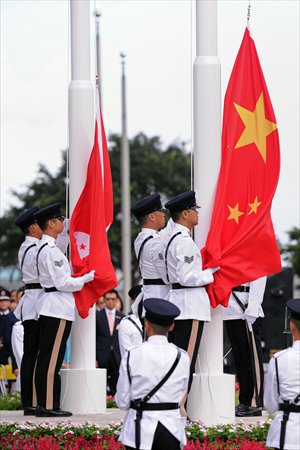Protests not a sign of desire to separate

Yesterday was the 16th anniversary of Hong Kong's return to China. It was the occasion for many activities, including protests on the streets where participants shouted a variety of slogans related to democracy, universal suffrage, animal protection and demolition projects. Despite the relatively small scale of this year's protest compared to previous years, it still made headlines.
Media tend to focus on negative news, whether it is in Hong Kong or the mainland. The mainland has given growing attention to public opinion in Hong Kong, but we suggest a more mature approach and attitude toward understanding public opinion in Hong Kong.
Hong Kong has adopted a different political system from the mainland, which better enables the public to express anger and opposition. But this doesn't necessarily guarantee all appeals will be responded to or satisfied. It would be abnormal if Hong Kong didn't have protests.
The mainland should better adapt to Hong Kong's political system. In this case, the influences of Hong Kong's opposition would automatically be diminished.
From the perspective of the mainland public, Hong Kong is a paradise for tourists which provides good bargaining. Few mainland visitors are interested in Hong Kong politics, and almost nobody believes "severe problems" will happen in Hong Kong, such as a confrontation with the central government or "Hong Kong independence."
The principle of "one country, two systems" has been smoothly carried out since Hong Kong's return. In recent years, some Hong Kong residents have held strong negative emotions toward the mainland, most of which are related to disputes concerning livelihoods, including the complicated feelings of Hong Kong residents brought by the rapid economic development of the mainland.
Hong Kong in fact has increasingly closer ties with the mainland, and patriotism is closely related to the interests of Hong Kong residents. Magnifying Hong Kong's "independent impulse" makes no sense.
Hong Kong's system is more flexible at mobilizing public opinion than the mainland's, which allows some to maximize their interests by expressing radical opinions and taking aggressive actions. The mainland should keep a sober mind and understand it's not necessary to respond to them all.
Hong Kong still has the status of an independent economy. It is in the interests of the mainland to create external conditions to maintain Hong Kong's prosperity. But the mainland's support for its economy shouldn't be taken for granted or Hong Kong will blame the central government for anything that goes wrong. This should be corrected.
Prosperity is conducive to Hong Kong's stability and the welfare of Hong Kong residents. But it is no longer politically connected to Hong Kong's return to the mainland.
Economic vitality should be the result of the hard work of local people. The solution to many specific issues of Hong Kong will decide the content of "Hong Kong People administering Hong Kong."